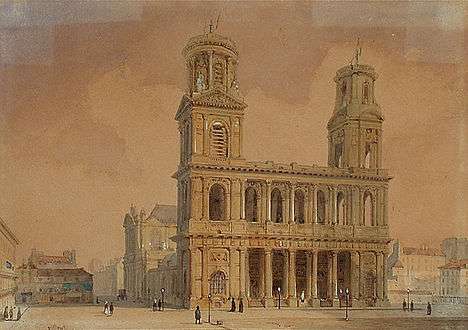La Messe de l'athée
 Église Saint-Sulpice, illustration by François-Étienne Villeret | |
| Author | Honoré de Balzac |
|---|---|
| Country | France |
| Language | French |
| Series | La Comédie humaine |
Publication date | 1836 |
La Messe de l'athée (English "The Atheist's Mass") is a short story by Honoré de Balzac, published in 1836. It one of the Scènes de la vie privée in La Comédie humaine.[1]
Plot summary
The main character, Desplein is a successful surgeon and an atheist. His former assistant and friend is Doctor Horace Bianchon. One day Bianchon sees Desplein going into the Saint-Sulpice church, and follows him. He sees Desplein alone attending a mass. After Desplein departs, Bianchon questions the priest and finds that Desplein attends a mass at the church four times a year which he himself pays for.
A few years later, Bianchon again sees Desplein going into Saint-Sulpice for the regular mass. This time he questions Desplein about it. Desplein explains that the mass is in memory of a friend of his, a water carrier named Bourgeat. When Desplein was a poor medical student, Bourgeat was his neighbour in the same building. The landlord evicted both of them on the same day. They agreed to look for a new place together. They eventually found two cheap rooms in the attic of another building. From then on, Bourgeat became a father figure to Desplein. He helped to pay for Desplein's education, and did menial tasks like cutting the wood. After Desplein became successful, he bought Bourgeat a horse and cart for his water carrying work.
After Bourgeat's death, and knowing that Bourgeat was a devout Catholic, Desplein decided to have four masses a year for Bourgeat at Saint-Sulpice church.
Recurring characters
Bianchon appears in several novels and stories of La Comédie humaine, including Le Père Goriot. He is the narrator of Étude de femme and La Grande Bretèche.[2]
Themes
Sylvia Raphael wrote "..the unselfish devotion of the humble water-carrier is matched only by the profound gratitude and deep religious feeling (in the broadest sense of those words) of the irascible, often selfish, eminent atheistic surgeon. Balzac's awareness of the complexity of human beings, of the coexistence within them of conflicting traits, comes out clearly in the story of Desplein who, self-centered and ambitious, forms a bond with the water-carrier which survives even the latter's death."[2]
References
- ↑ Honoré de Balzac. "The Human Comedy: Introductions and Appendix". Project Gutenberg. Retrieved 16 April 2018.
- 1 2 Raphael, Sylvia. "Introduction". Honoré de Balzac: Selected Short Stories. Penguin Classics, 1977.